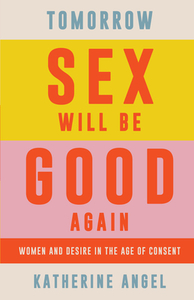You need to sign in or sign up before continuing.
Take a photo of a barcode or cover
735 reviews for:
Tomorrow Sex Will Be Good Again: Women and Desire in the Age of Consent
Katherine Angel
735 reviews for:
Tomorrow Sex Will Be Good Again: Women and Desire in the Age of Consent
Katherine Angel
Definitely interesting and informative on feelings I've had regarding my own sexual experiences. I would have liked more answers from this book, rather than a continuos posing of questions (although they were good questions). A great all-around perspective on the dynamics of sex, from different points of inflection: consent, pleasure, vulnerability, shame, gender, masculinity, love, etc.
All around really good read.
I see the painful – and familiar – experience of being pulled in different directions; of having to balance desire with risk; of having to pay attention to so much in the pursuit of pleasure.
Will I be in danger? In revealing myself, have I foregone privacy and dignity? Will I be pursued, haunted by my own actions? Will I be able to resist the unwanted desires of others? Has saying yes precluded my ability to say no?
Who pays the price for this dewy-eyed, nostalgic view of teenage fumbling? Who learns what, exactly? For whom is bad sex bad, and in what ways? We know that women pay a far higher price for sexual activity than men do, whether in risks of pregnancy, slut-shaming or the double-standard. Pleasure is not equally distributed
Desire isn’t always there to be known. Vulnerability is the state that makes its discovery possible.
All around really good read.
I see the painful – and familiar – experience of being pulled in different directions; of having to balance desire with risk; of having to pay attention to so much in the pursuit of pleasure.
Will I be in danger? In revealing myself, have I foregone privacy and dignity? Will I be pursued, haunted by my own actions? Will I be able to resist the unwanted desires of others? Has saying yes precluded my ability to say no?
Who pays the price for this dewy-eyed, nostalgic view of teenage fumbling? Who learns what, exactly? For whom is bad sex bad, and in what ways? We know that women pay a far higher price for sexual activity than men do, whether in risks of pregnancy, slut-shaming or the double-standard. Pleasure is not equally distributed
Desire isn’t always there to be known. Vulnerability is the state that makes its discovery possible.
challenging
hopeful
informative
reflective
fast-paced
challenging
informative
slow-paced
challenging
informative
Adds much needed nuance to the conversation around consent
"We are yet again in a moment in which it seems to be tomorrow -- a tomorrow just on the horizon, close enough to touch -- that sex will be good again; a moment in which we conjure away the present and appeal to the future, armed as we are with the tools needed to undo past repression -- the tools of consent and, as we'll see, of sex research. But speech and truth-telling are not inherently emancipatory, and neither speech nor silence are inherently liberating or oppressive. What's more, repression can operate through the mechanisms of speech, through what Foucault called 'the incitement to discourse'. Consent, and its conceit of absolute clarity, places the burden of good sexual interaction on women's behaviour -- on what they want and on what they can know and say about their wants; on their ability to perform a confident sexual self in order to ensure that sex is mutually pleasurable and non-coercive. Woe betide she who does not know herself and speak that knowledge. This, as we'll see, is dangerous."
"Consent rhetoric owes quite a lot to confidence culture; it too often speaks in the language of encouragement and empowerment. Many legal formulations of affirmative consent, and many everyday invocations of it, do acknowledge that consent must be ongoing -- that our feelings can change and we can change our minds. But the rhetorical thrust of much consent culture -- the well-meaning advice, the injunctions and admonitions -- is suspicious of tentativeness; it privileges a robust self-knowledge about desire and a capacity for vocal expression of it. [...] Consent rhetoric doesn't allow for ambivalence, and it risks making impermissible -- indeed dangerous -- not simply a difficulty in expressing desire, but the experience of not knowing what we want in the first place."
"Consent rhetoric owes quite a lot to confidence culture; it too often speaks in the language of encouragement and empowerment. Many legal formulations of affirmative consent, and many everyday invocations of it, do acknowledge that consent must be ongoing -- that our feelings can change and we can change our minds. But the rhetorical thrust of much consent culture -- the well-meaning advice, the injunctions and admonitions -- is suspicious of tentativeness; it privileges a robust self-knowledge about desire and a capacity for vocal expression of it. [...] Consent rhetoric doesn't allow for ambivalence, and it risks making impermissible -- indeed dangerous -- not simply a difficulty in expressing desire, but the experience of not knowing what we want in the first place."
challenging
emotional
informative
inspiring
reflective
sad
medium-paced
Slowed down in the middle, but the first and last chapter really anchored this for me. I really enjoyed Thai analysis and perspective!
challenging
dark
informative
reflective
medium-paced






